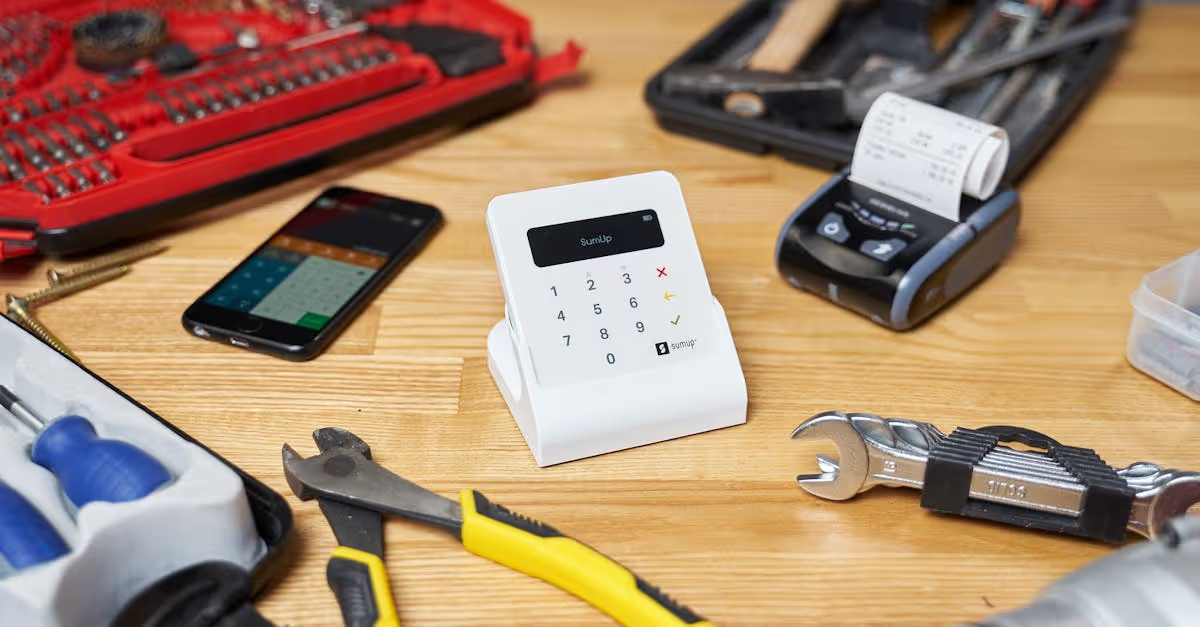Key Takeaways
- Importance of Regular Maintenance: Understanding and maintaining pool equipment like filters, pumps, and vacuums is essential for a clean and enjoyable pool experience.
- Common Equipment Issues: Clogged filters, malfunctioning pumps, and ineffective vacuums are among the most frequent problems pool owners face.
- Repair Services Available: Professional repair services can address specific issues such as leak fixes, motor replacements, and cleaning for all types of pool equipment.
- Diagnostic Services Role: Early identification of pool equipment issues through diagnostic services can prevent costly repairs and downtime.
- Technological Integration: Utilizing technician management and field service automation tools streamlines repair processes and enhances customer satisfaction.
- Proactive Maintenance Tips: Regular inspections and maintenance routines for pumps, filters, and vacuums help extend their lifespan and maintain optimal performance.
Owning a pool brings joy and relaxation, but it also comes with maintenance challenges. Did you know that nearly 30% of pool owners face equipment issues each season? Understanding the repair services available for essential pool equipment like filters, pumps, and vacuums can save us time and money while keeping our pools in top shape.
From clogged filters to malfunctioning pumps, knowing how to address these common problems is crucial. With proper repair services, we can ensure our pools remain clean and inviting. Let’s dive into the various repair options available and discover how to keep our pool equipment running smoothly all year round.
Overview of Repair Services for Pool Equipment
Repair services for pool equipment play a vital role in keeping our pools in pristine condition. Common pieces of equipment, like filters, pumps, and vacuums, require regular attention to function effectively. Addressing issues promptly can prevent more complicated problems down the line.
Filters
Filter maintenance can make or break our pool's cleanliness. Clogged filters can lead to murky water, which nobody wants. We often find ourselves replacing filter cartridges or backwashing sand filters. Repair services typically offer filter cleaning, replacement parts, and advice on optimal maintenance schedules. Regular checks can help avoid costly repairs and keep our water sparkling.
Pumps
Pumps are essential for circulating water and ensuring our pools stay clean. Malfunctioning pumps disrupt this flow, leading to stagnant water and potential algae growth. Repair services can test pump functionality, fix leaks, and handle motor replacements. We often overlook the importance of quiet operation; noisy pumps signal underlying issues. Consistent monitoring and prompt repairs can save us headaches in the summer.
Vacuums
Vacuums assist with the physical removal of debris from our pools. When vacuums lose suction or get stuck, cleaning becomes a chore. Maintenance services can troubleshoot common vacuum issues such as clogged hoses or damaged brushes. Regular inspections keep our vacuums performing flawlessly, enhancing our overall pool experience.
Technician Management Tools
Integrating technician management software improves the efficiency of repair services. Platforms like job scheduling software for technicians streamline appointments. Using route management software can optimize travel times, ensuring technicians arrive promptly. These solutions enhance communication and fuel customer satisfaction. We can track service history, set reminders for routine maintenance, and access repair status through a service business customer portal.
Field Service Automation
Embracing field service automation assists in keeping our pool equipment well-maintained. Automated field service solutions facilitate quick responses to service requests, allowing us to get back to enjoying our pools sooner. Engaging with mobile workforce management tools lets technicians stay updated while on-site, ensuring no detail gets overlooked.
Customer Engagement
A robust customer engagement strategy is crucial for service companies. Using service invoicing software accelerates billing processes, offering transparency. Homeowner service apps keep us informed about repairs and maintenance schedules. Honest communication builds trust, leading to better experiences for everyone involved.
As we navigate the intricacies of pool ownership, understanding repair services for our equipment becomes essential. We know how troublesome a malfunctioning pump can be or how frustrating it is to see our pool turn green. Familiarizing ourselves with these repair services empowers us to take charge, maintain our aquatic oasis, and enjoy our time by the pool with friends and family.
Common Pool Equipment Types
Understanding common pool equipment types helps us maintain the enjoyment of our outdoor oasis. We'll dive into the key components: filters, pumps, and vacuums. Each plays a critical role in keeping our pools clean and functional.
Filters
Filters act as the first line of defense for pool cleanliness. They keep debris and dirt from clouding the water. We can perform services like cleaning or replacing the filter medium, which could be sand, diatomaceous earth (D.E.), or cartridges. Repair services diagnose problems such as leaks or clogs. Companies like Aqua Pool & Spa Pros and Chicago Pool Maintenance offer comprehensive filter repairs for all brands. For those looking for cost-effective solutions, Leslie's Pool Supplies provides free in-store labor for repairs; we pay only for necessary parts. Regular attention to our filters means clearer water and fewer headaches.
Pumps
Pumps circulate pool water, ensuring proper filtration. Services for pumps include diagnosing issues like motors that won't start or unusual noises. Replacing worn components helps restore efficiency. We can prevent many repairs by keeping an eye on the pump's overall performance. Routine checks and maintenance keep our pumps humming smoothly. Popular repair services understand these critical aspects and apply their expertise to fix problems swiftly.
Vacuums
Pool vacuums remove debris from the pool floor, preventing dirt buildup and algae growth. We rely on automatic or manual vacuums to ensure our pools remain sparkling clean. Repair services focus on motor problems, clogged hoses, or worn brushes. Regular maintenance checks can extend the life of our vacuums, making these tools reliable for our cleaning routines. Engaging with services that specialize in vacuum care helps us maintain a pristine swimming environment.
Understanding these critical components empowers us to take charge of our pool maintenance needs. We can enjoy our pools more when we know how to tackle the common challenges associated with pool equipment.
Signs Your Pool Equipment Needs Repair
Recognizing signs of dysfunction in our pool equipment can prevent larger issues down the line. Several indicators suggest our pool might need some TLC.
Performance Issues
Performance problems manifest in various ways. Poor water circulation often causes dirty or stagnant water, hinting at pump or filtration system issues. Higher energy bills can arise when a pump or heater operates inefficiently due to malfunctioning parts. Additionally, if we notice dirty or cloudy water, this signals potential problems with equipment affecting clarity. Monitoring these signs helps us maintain a clean pool environment.
Unusual Noises
Unusual noises from pool equipment are common warning signs. If we hear grinding or hissing sounds, these may indicate that a pump or motor is experiencing trouble. Such noises can reflect imbalances or mechanical failures that require prompt attention. Addressing these sounds early can prevent more severe damage and maintain smooth operation. Regular check-ins with our equipment can keep us ahead of potential issues, ensuring pools remain enjoyable retreats.
Repair Services Offered
Several key repair services help us maintain the functionality and safety of our pools. Common issues like clogged filters and malfunctioning pumps require prompt attention. Let's delve into the details of two essential categories of services: diagnostic and repair options.
Diagnostic Services
Diagnostic services identify issues in our pool equipment before they escalate. Technicians assess filters and pumps, checking for common signs of trouble, such as reduced suction power or unusual noises. Regular checks can save us from future headaches and hefty repair bills.
For instance, if a pool pump starts making odd sounds, it might just be its way of saying it's ready for some TLC. Engaging knowledgeable professionals allows us to address problems early, preserving our pool's health.
Moreover, using tools like technician scheduling software streamlines the process. We can quickly set up appointments, reducing waiting times. There’s a certain comfort in knowing that with the right service management, our pool’s conditions quickly improve.
Replacement and Repair Options
Pool filters and pumps require occasional replacement or repair to maintain optimal efficiency. For filters, repair often includes cleaning or replacing the media, whether it’s sand, diatomaceous earth (D.E.), or cartridges. Timely interventions, like changing a clogged filter, enhance filtration and keep our water clear.
When it comes to pumps, addressing issues like leaks or blockages prevents larger malfunctions. Quick fixes lead to improved water circulation. If a pump isn't working well, we might notice cloudy water creeping in—definitely not what we want!
Services for replacement and repair typically involve a clear assessment of costs and timelines. Having access to comprehensive service business automation tools keeps things organized and transparent. With our pools looking great and functioning well, we can all enjoy summer fun without interruptions.
Maintenance Tips for Pool Equipment
Maintaining pool equipment, like pumps, filters, and vacuums, keeps our pools clean and functional. Here are practical maintenance tips for each type.
Pool Pumps
- Inspect the pump strainer basket weekly. Cleaning it prevents blockages and reduces strain on the motor.
- Examine the pump lid regularly. Replace it if we find cracks, and lubricate the O-ring or gasket with Teflon-based lube to maintain a tight seal.
- Listen for unusual noises. Sounds like rattling or squeaking indicate issues that require attention. Check for water leaks or air pockets around the lid, signaling a possible air leak.
- Clean the area around the pump. Clearing out dust and dirt prevents overheating, promoting longer pump life.
Pool Filters
- Check filters every month. Cleaning or replacing the filter media helps maintain clear water. Dirty filters can lead to poor circulation and cloudy water.
- Inspect filter pressure gauges. A higher reading than normal means it’s time to clean the filter. Keeping an eye on this can save bigger headaches later.
- Backwash as needed. The frequency of backwashing depends on usage and debris levels. Regular backwashing allows filters to work efficiently.
Pool Vacuums
- Examine vacuum hoses monthly. Check for leaks and wear. A damaged hose can affect performance, making it harder to remove debris.
- Replace bags or cartridges regularly. Clogged bags hinder suction. Keeping these clean ensures efficient operation.
- Inspect brushes and rollers. Worn accessories lead to ineffective cleaning. We should replace or repair them as necessary.
General Tips
- Schedule regular maintenance. Engaging professionals periodically helps track equipment performance. Implementing a technician management tool can support this effort.
- Consider automated field service solutions. Utilizing software for service scheduling streamlines maintenance tasks and keeps our equipment in top shape.
- Communicate with service professionals. Good communication enhances maintenance strategies, leading to better overall service.
By following these tips, we maintain our pools effectively and avoid potential issues down the line. Engaging in regular maintenance can really make a difference, don’t you think? It’s like giving our pools a spa day, keeping them fresh and welcoming for those hot summer days.
Conclusion
Maintaining our pool equipment is essential for enjoying a clean and inviting swimming environment. By understanding the repair services available for filters, pumps, and vacuums, we can address issues promptly before they escalate. Regular maintenance not only enhances the performance of our equipment but also extends its lifespan, saving us time and money in the long run.
Recognizing the signs of potential problems allows us to take proactive steps, ensuring our pools remain safe and enjoyable. With the right approach to repair and maintenance, we can transform our pool into a refreshing retreat that we love to share with family and friends. Let's commit to staying informed and engaged in our pool care journey.
Frequently Asked Questions
What are the common challenges of pool ownership?
Many pool owners face issues with their equipment, with about 30% encountering problems each season. Common challenges include clogged filters, malfunctioning pumps, and ineffective vacuums, which can lead to dirty water and maintenance headaches.
How can I identify if my pool equipment needs repair?
Signs that your pool equipment may need repair include poor water circulation, high energy bills, cloudy water, or unusual noises like grinding or hissing. Addressing these issues early can prevent more significant problems down the line.
What are vital pool equipment maintenance tips?
To maintain your pool equipment, regularly inspect and clean the pump strainer basket weekly, check filter pressure gauges monthly, and examine vacuum hoses for leaks. Scheduling regular professional maintenance can also ensure peak performance.
Why is regular maintenance of pool equipment important?
Regular maintenance of pool equipment like filters, pumps, and vacuums is essential to keep your pool clean and functional. It prevents issues that can lead to more substantial repairs and enhances the overall enjoyment of your pool.
How can I save money on pool maintenance?
Understanding your repair options and conducting regular equipment checks can save money on maintenance. Engaging professionals for diagnostics and routine service can help identify issues early, reducing the risk of costly repairs later.






